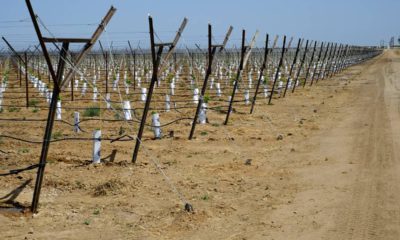Entertainment
So, Hollywood, Where Is the Oscar Love for Oakland?
Published
6 years agoon
By
Joe Mathews
The best California movie scene of recent vintage is the opening of the 2018 film Sorry to Bother You. A man and his girlfriend are getting intimate when his apartment suddenly fills with daylight, making their union visible to the people outside on an Oakland street.

Opinion
Joe Mathews
This example of love interrupted is indicative of another unconsummated relationship—between Oakland and the Oscars.
Over the past year, the city of Oakland has inspired more great films than even movie-mad nations like France and Japan. This reflects both a rising generation of filmmakers with O-Town roots, and the city’s own ascendancy in an era that prizes authenticity. Since all the real people have left unaffordable San Francisco, and since there were never many real people in L.A., filmmakers seeking a relatable California reality are drawn to Oakland.
So, Hollywood, where is the Oscar love?
Oakland won’t be shut out at the Academy Awards on February 23. Oakland-born (and Hayward-raised) actor Mahershala Ali, is favored to win his second Oscar in three years, for playing pianist Don Shirley in Green Book. And Black Panther, which begins and ends in Oakland, is nominated for best picture.
Oakland Gets Its Due in Other Ways
But Black Panther is unlikely to win. The film’s maker, Oakland’s own Ryan Coogler, didn’t get nominated for best director, even though he brought to life the land of Wakanda, which fulfilled Californians’ dreams of a finished and functional high-speed rail system. Coogler was previously snubbed by the Oscars for his brilliant 2013 film Fruitvale Station, about the killing of Oscar Grant by a BART police officer in Oakland.
And the Academy completely overlooked two of the past year’s very best films: Sorry to Bother You, a satire with sci-fi elements (and that great intercourse-gone-awry opening), and Blindspotting, a beautiful buddy film about two troubled young men.
Both movies were set in Oakland and made by Oaklanders, and are about conserving the traditions and neighborhoods that make the place special. To that end, both films cast Oakland as the first line of defense for a world fighting the disruptive power of technologists from the other side of the bay.
In Blindspotting, the main character—played by the film’s own screenwriter, the Oakland-born actor-singer Daveed Diggs—is an ex-con on probation who works as a mover, bringing richer people into his own gentrifying city. Sorry to Bother You, from director Boots Riley, is a very black comedy about a Silicon Valley company using a business model secretly built on slavery and turning humans into animals. Absent a better explanation for its Oscar shutout, I wonder if that plot line cut too close to the bone for Netflix and Amazon, which now fund so much of Hollywood.
Of course, Oakland is getting its due in other ways, since it’s that rare American place still distinctive enough to convey its own message.
In politics, Oakland-born Kamala Harris, who rose through San Francisco’s establishment, tried to seize back some Oaktown cred by kicking off her presidential campaign kick-off at Frank Ogawa Plaza.
In literature, Tommy Orange’s There There, a novel about Native Americans in Oakland, has been winning awards for its portrayal of the city’s diversity.
Director Boots Riley Says He Doesn’t Care About Not Being Nominated
“Cities form in the same way as galaxies,” Orange writes. “Urban Indians feel at home walking in the shadow of a downtown building. We ride buses, trains, and cars across, over, and under concrete plains. Being Indian has never been about returning to the land. The land is everywhere or nowhere.”
The most honored-star of the past generation, Tom Hanks, still boasts about being from Oakland. Oakland can claim George Stevens, the Oscar-winning director of A Place in The Sun, who grew up in an Oakland theater family, and Clint Eastwood, who was born in San Francisco but grew up in Piedmont and went to Oakland Technical High School. And serious Star Wars fans will tell you that Oakland is the real hometown of both Luke Skywalker (Mark Hamill was born and lived there until moving to San Diego at age 11) and Yoda (Frank Oz, a child immigrant from Europe, was raised there and got his start as a puppeteer at the city’s famed Children’s Fairyland).
After the Oscar snub, Sorry to Bother You director Boots Riley declared he didn’t care about not being nominated. Worrying about what the rest of the world thinks is not a very Oakland thing to do.
But the rest of the world would benefit from seeing more of the cinematic stories emerging from Oakland.
About the Author
Joe Mathews writes the Connecting California column for Zócalo Public Square.
You may like
-


California Pins Vaccine Hopes on Biden Administration
-


Walters: After COVID-19, Drought Threat Still Looms
-


Fierce California Winds Fan Fires, Topple Trees and Trucks
-


Monarch Butterfly Population Moves Closer to Extinction
-


Newsom Sets New Tone for California, White House Partnership
-


California Guard Pleads Guilty to Lies in Inmate’s Death













